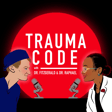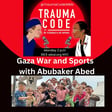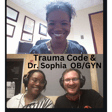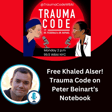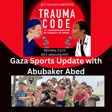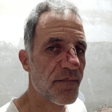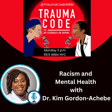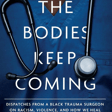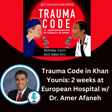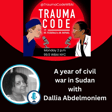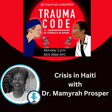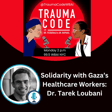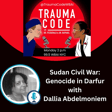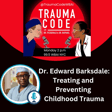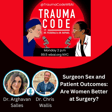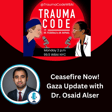Become a Creator today!Start creating today - Share your story with the world!
Start for free
00:00:00
00:00:01

Surgical Solidarity in Gaza with Feroze Sidhwa
We discuss our surgical witness to genocide in Gaza including gun shot wounds to the head in chest in children, the kidnapping and torture of healthcare workers and the demolition of water, sanitation and hygiene infrastructure in Gaza. Dr. Sidhwa shares his collaboration with the Uncommitted movement at the DNC in Chicago.
Transcript
Introduction to Trauma Code on WBAI
00:00:48
Speaker
Trauma Code to New York City, Trauma Code to WBAI. I am Dr. Simon Fitzgerald, a Brooklyn trauma surgeon and surgical intensivist. And I am Dr. Cassandra Rafael, an adult and child psychiatrist. Welcome to Trauma Code. Together we will focus on healing of my own body and community from trauma. We'll discuss how wellness fits into the culture at large. Join us on Monday at 2pm on WBAI.
Dr. Sidwa's Work in Gaza
00:03:36
Speaker
I want to welcome a guest, Dr. Faro Sidwa. Your first time ah as a guest on the show in a way, but we broadcast. You were kind enough um after I did some solidarity work ah via telemedicine.
00:03:53
Speaker
in Conunice in Gaza in February, you ah did one better and and showed up in person and provided some medical care um and some support ah to trauma teams at um European Hospital in Gaza. And you ah came all the way to Brooklyn and talked to some of our residents and students about that experience.
00:04:13
Speaker
um ah And you've been doing even more work related to, um you know, the witness as well as the the medical work that that you um took part in Gaza. And I wanted to get to that, but um ah last time, you know, we played your presentation, but what what I'd actually like to do is give you opportunity to introduce yourself a little bit to our New York audience. um Dr. Ferro Sidwa, just briefly, you know, where are you from? And for example, where did you go to high school?
00:04:44
Speaker
Yeah, absolutely. So yeah, my name's Feros Sidwa. I'm a trauma surgeon out in California now.
Dr. Sidwa's Educational and Political Journey
00:04:51
Speaker
And yeah, no, I went to a high school in Flint, Michigan, actually, after, let's see, after my sophomore year, we moved to Texas. So I ended up graduating ah from a suburb of Houston called Sugarland and at Clements High School. But in Flint, I went to Carmen Ainsworth High School.
00:05:11
Speaker
Excellent. um And ah so you're just a humble guy from Flint, Michigan, but you have, it correct me if I'm wrong, quite a bit of an experience oh in addition to your um you know medical education, your surgery training, and then trauma critical care training, quite a bit of global surgery experience, is that right?
00:05:32
Speaker
yeah Yeah, I've been lucky in that way. um you know when i was when i was going too so you know and in In college, i I started learning about the Arab-Israeli conflict. yeah when i was a ah freshman it must have been yeah When I was a freshman, the second Intifada broke out, so um it was was just the thing to be involved in. I stayed involved in it after that. I've edited some books on the topic and stuff like that. so So I stuck with it and that kind of got me started down this global health path because I'd gone to college thinking I was going to be a physician because my dad's a doctor and but you know the second intifada happened, 9-11 happened, it was a very politicizing time and so after college I lived in Israel in Haifa for a year or a little bit less than a year and
00:06:27
Speaker
And during that time, I actually, I would tour around in the West Bank and I ah i think i i think I was in Hebron, I just can't remember now, but um but while I was there, I met a delegation from ah Physicians for Human Rights Israel and they, you know, the people I gravitated towards there were physicians, but when when I talked to these these folks, they really, ah the the way they the way they framed what it is to be a physician and the way they understood it really appealed to me.
Medical Missions in Gaza
00:07:01
Speaker
So that put me down. though I was like, okay, yeah, i'll I'll definitely go to medical school. So it came back into that. And then, um you know, since then, from the standpoint of any kind of political work I've done in the United States has almost always been focused on ah the Palestinians. But
00:07:21
Speaker
um and But i've done I've done plenty of surgical work elsewhere. yeah i've I've done a lot of, most most of what I've done is actually been surgical education work. So like I just got back from Burkina Faso. We were doing so trauma and trauma training for physicians and also for for healthcare providers there, ah which was great. That was with a buddy of mine's NGO um that that that works on issues in Burkina Faso.
00:07:48
Speaker
And then, you know, I've been to Ukraine three times in the past year. I've worked in Southern Zimbabwe. I've worked in Haiti. So yeah, now i've I've been really lucky to to get her around the world, see see how other people live or I should say are forced to live. And yeah, it's it's been it's a humbling thing for sure.
00:08:11
Speaker
And so, and I guess that's the background that um that brought you, that that you brought to your experience in Con unison. And if I remember correctly, I think the Society for Critical Care Medicine had advertised a call for um for of physicians, for surgeons, ah through, I guess, a Palestinian-American healthcare organization. um is that Is that the path? Is that how you um you know were connected with a European hospital in Gaza?
00:08:45
Speaker
Yeah, exactly. So, um you know, the Palestinian Ministry of Health hospitals like European and Shifa and Indonesian, all all all of the standing hospitals basically um are are assisted by the World Health Organization. And so the WHO puts out calls for volunteers through national um NGOs. So, you know, whatever they are in Britain, whatever they are in France, and then in the US, one of them was the Palestinian American Medical Association. And they
00:09:17
Speaker
um It was a convoluted thing. But somehow they ended up getting the Society for Critical Care Medicine to issue a call or to to amplify their call for volunteers. ah So I had actually never even heard of PAMA until they they called the Palestinian American Medical Association PAMA. I had never heard of them until I got that call for volunteers. But I was like, oh, great. that's ah you know This is the kind of thing that I've been waiting my whole life to do, um is to actually you know work and work. I'd never actually been in Gaza before. I've been in the West Bank.
00:09:47
Speaker
Um, like I mentioned, uh, and I, I, I went back there when I was in medical school as well and actually worked in a hospital, but I'd never actually been in Gaza and, uh, certainly I didn't want to see it in this state, but that was the state it was in. So.
00:10:01
Speaker
So can you tell us a little bit about that? This would have been in March. um And, you know, just just frame that a little bit. What what was it like getting into into communist, which is just to the north and east of Rafa?
Challenges in Delivering Medical Supplies
00:10:16
Speaker
And what did you see at European Hospital? Yeah, um you know, the the journey to Gaza is an interesting one, um at least the way we the way we did it.
00:10:32
Speaker
Uh, we, you know, when we, when we went there, like you said, it was March. It was March 25th, April 8th. Uh, the, the Rafa border was still open. Uh, the Israelis hadn't taken the Philadelphia corridor yet. So, um,
00:10:45
Speaker
you you flew to Cairo, you joined a UN n convoy over through the Sinai. ah you know The Sinai is in open military revolt against the the the central Egyptian government. so the So there's a bunch of military checkpoints. The trip takes like 12 hours. And then you get to Rafa,
00:11:06
Speaker
And the Rafa crossing is this really bizarre, you'd you'd expect it to be this like giant military installation. It just kind of looks like a Midwestern airport, but there's one scanner, there's two confused Egyptian soldiers, they don't know what to do. ah So they just scan everyone's bags, sometimes the scanner is broken, so they don't scan anything. And you go in and the advantage of this,
00:11:27
Speaker
ah probably an unintended advantage of this the way this was set up is that if you take or if you took anything in your ah in your luggage, it just went through as long as it wasn't a gun or you know an explosive of some kind. So they really were just focused on security.
00:11:45
Speaker
and that allowed us to take in large amounts of medical and surgical equipment. So we took ah the hundreds of pounds of antibiotics, so maybe a thousand pounds worth of surgical implants, org and other surgical equipment for orthopedics and for other things. ah Tons of just basic, simple things like gauze, skin prep, just just normal, you know the the kind of thing you just pick up off a shelf in the US, nobody even bothers charging for it. you know And But these things were totally lacking in Gaza's hospitals, so that's what we took. Suture, knives, you know, limiting scalpels, things like that. um It's different now, unfortunately, because the once the Rafah crossing was taken, Israel had total control over who goes in and out of Gaza, and now it's now the the
00:12:36
Speaker
Procedure for getting into the Gaza is so convoluted and ridiculous that you can't take anything useful but ah but yeah, so then you get you get onto the Palestinian side of Rafa and ah You get into a van ah the Ministry of Health had provided some vans and you that your team leader has gotten access to a smartphone app through the World Health Organization that alerts COGAT, I don't know exactly what the acronym is, it's coordination office for something, something. Anyway, it's the part of the Israeli military that's ah in theory supposed to ensure that humanitarian and other groups can move through Gaza without being attacked by the Israeli military. And
00:13:22
Speaker
the ah you request deconfliction of a particular route. So for us it was the Salahuddin road ah going up to a European hospital from the Rafah gate and you just wait until it turns green. So I think after about 40 minutes it turned green and apparently it'll only turn green for 15 minutes and it's a 15 minute drive. So these drivers just floored it. I mean, like it's so it's amazing that we didn't run anyone down on, you know, the Salahuddin road is known as the the road of death in Gaza for for very good reason.
00:13:50
Speaker
ah So they just they absolutely want to get off the road as fast as possible. So they just floored it and um Uh, yeah, yeah, it it was an interesting, uh, interesting, right.
Impact of Blockades on Healthcare
00:14:00
Speaker
That's for sure. Right. And even what you said, there's a lot there. I i learned only after the start of the conflict in October, the escalation of the conflict that, um, the word gauze is a derivation of Gaza because that's where it historically had been, um, developed and manufactured. Um, and the fact that even that is completely lacking and you know, for years going back at least until
00:14:24
Speaker
um What was it, 2007, a lot of basic medical equipment has been forbidden by Israeli authorities and their siege of Gaza, including tourniquets, for example, um with the theory that they could be dual use, they could be used in the field. um And so they forbidden from being in hospital. so um and And now, as you mentioned, not only the capture, but I've seen the destruction of the Rafah crossing, literally the bulldozing of it.
00:14:50
Speaker
that yeah That limited route that that that you guys had to take in basic medical equipment is closed. So um I'd like to hear more of what you witnessed, but keeping in mind that um the the shortages go back way before October and have gotten worse since you left in April.
00:15:06
Speaker
Yeah, actually, if you don't mind, um i hate I know people don't like to hear history on ah on a radio podcast, but the the the history actually happens to be really important here. In 2000, people have to forgive me if I'm off by a year or two, but ah in 2004 is when the Israelis withdrew their settlers from Gaza and and instead of occupying Gaza directly, they occupied it from just on the on the edge of the territory.
00:15:34
Speaker
and they encircled Gaza with with what was called the Israel-Gaza command or the israel so Israeli-Southern command. um And the US, yeah Egypt kind of cooperated with this to varying degrees. ah So that and that was 2004, it was 20, 21 years ago. In 2005 Hamas won the Palestinian Legislative Council elections ah and in, or actually sorry, I think maybe that was in 2006. And six and um In 2006 or 2007, there was a US-Israeli Fatah-backed, Fatah is the Hamas' main Palestinian rival in the in the Palestinian political sphere. ah they All three, ah you the US, Fatah, and Israel come up collaborated together to overthrow the Hamas government in by attacking it in Gaza.
00:16:24
Speaker
ah Hamas learned of this and preempted the putsch. And after that, I thought that was basically thrown out of Gaza. ah Immediately, Israel instituted a land sea and air blockade um of Gaza, which is quite literally unique in the world. There's nothing else like it. And probably in the history of the modern world, there probably hasn't been even anything even remotely like it.
00:16:48
Speaker
um The blockade of Cuba doesn't even come close to how severe this is. ah it got After just one year, so in 2008, after just one year of the blockade, Mary Robinson, who's the the respected elder stateswoman, she was the former president of Ireland, she visited Gaza and afterwards she told the BBC, I think I'm quoting her directly word for word, their whole civilization has been destroyed.
00:17:14
Speaker
It's and she said it's unbelievable that the world doesn't care or while this is happening. That was 2008. You know, so like what 16 years ago or something, the ah it's just totally. So this is the state that Gaza has been in since 2008. Their whole civilization has been destroyed.
00:17:31
Speaker
ah the the blockade became so restrictive that instead of publishing a list of banned items, Israel eventually just published a list of allowed items, which was something like 30 or 35 things long. Israel has banned things like chickens, goats, ah bonbons, potato chips. like absolutely It's absolutely insane what has been done to the Gaza Strip over the past 21 years, however you want to say it.
00:17:58
Speaker
So and caught up in all of that, the health the destruction of the healthcare system and the refusal to allow anything of use into, or even or if it is allowed in, in very, very small quantities has gone along with that. It's it's just it's a small part of the blockade. it's not it's it's So this this this whole blockade has been slowly degrading and destroying Palestinian society for almost two generations now.
00:18:23
Speaker
And it's really, ah the the effect it had is just absolutely devastating. And then on top of that, like you know, and your listeners probably already know, there have been repeated Israeli attacks on on Gaza that have just been utterly devastating. ah therere there They happened every year or two, but the the the there were two major ones, which was Operation Cast Lead in 2008 and 2009, and then Operation Protective Edge in 2014.
00:18:47
Speaker
um these instance this These just created enormous damage. ah which people the Like when the head of the ICRC went to Gaza after protective edges, this is in 2014, he said he had never seen destruction like this in his life.
00:19:03
Speaker
That's back in 2014. Now the whole place has just been obliterated. you know So the the the history of how Gaza got to be where it is, it none of this started on October 7th. I'm guessing your listeners understand that, but it's really important for people to remember ah what Gaza was on October 6th and what it's become since then. It's something quite quite much very much worse.
00:19:27
Speaker
And and um if I may, what I would add to that from my conversations with a lot of um Palestinian physicians in Gaza and other people who have worked in Gaza is that once the the effectiveness of the blockade really cut off ah Palestinian in Gaza, their access to health care facilities in places like Israel or Egypt,
00:19:49
Speaker
Um, a lot of people died, right? People had cancer died. People had kidney failure died. There's a lot of people who couldn't access medical care that wasn't available in Gaza. Um, and so there's a lot of pride also in Palestinian physicians in how, especially after that, you know, after that time, uh, the creation or the reinforcement of a, of, you know,
00:20:12
Speaker
In some ways, you know considering how much poverty there was, a relatively robust um health care um you know healthcare care system, healthcare care network. um and and so i think that's I think a lot of people have a hard time understanding um why you know we saw direct Israeli attacks um relentless on on um on ah healthcare care institutions, healthcare care workers, ambulances, ah hospitals. We saw the bombing and burning of al-Shifa, the main tertiary care center, their surgical um care center. um And when I was you know participating in in these
00:20:51
Speaker
ah ah telemedicine efforts kind of on the phone remotely with the trauma team in Con Eunice at Nasser hospital, we could hear the hospital being bombed on some of the communications and one of the the nurses was shot.
Attacks on Healthcare Facilities and Workers
00:21:06
Speaker
So that, you know, direct relentless attack that I think has killed now to estimate, I think the most recent one I saw was over 800 healthcare care workers have been killed and another 100 have been taken. um abducted basically. So I think that frames, um you know, you you talked to us a little bit about entering into Gaza and kind of rushing on that that road of death to European hospital. um And I just wanted to kind of add that to frame kind of this the situation when you got
00:21:36
Speaker
to European hospital, tell us a little bit about you know what you saw, what were the conditions there, what were the the people surviving and and um what what work could you do and what could you witness among your patients and their families?
00:21:51
Speaker
Yeah, so when we got to European Hospital, it was probably the best resourced city block in the Gaza Strip, and it was an utter and total disaster. ah the The first thing you notice when you get to Gaza is that there's children everywhere. I mean, it's it's a, I don't know if it's the youngest territory in the world, but it's an incredibly young territory. Half the population, literally 50% is under 18.
00:22:15
Speaker
um And I think 40% is under 15 years old. So it's extremely, extremely young. There's children everywhere. Like you you can't walk like three feet ah without kids just running into you. You know, it's it's pretty funny. The kids are like young young children are kind of allowed to run totally a buck in the Arab world. there' It's just a cultural thing.
00:22:35
Speaker
And so they're they're just running around playing. you know it's it's just it's ah It's incredible. And just it's it's really quite overwhelming, actually, how many kids there are. ah The next thing you realize is there's that this the omnipresence of drones overhead. Actually, it's funny, I was listening I had a bunch of voice notes that I made when I was was when i was in Gaza. And ah ah what i when i so I played one of them again just the other day. And and and immediately, as soon as I i got it, I was like, oh, that's the drone. I totally forgot that that was going to be always in the background, like 100% of the time, always in the background. um So you it's a very weird contrast to see this sea of children
00:23:21
Speaker
playing and realizing that there's this machine hang you know just hovering over a head that can just blast all of them to bits as soon as it wants to. and it's really just it's kind of a it's a really It's a terrifying realization when you're actually there and and and underneath these things. um ah But you know the the European hospital is empty now. it was It was forcibly evacuated by the Israelis, I think, on July 7th or something. but um the ah When we got there, there were about 15,000 people sheltering on the grounds of European hospital.
00:23:55
Speaker
um that not only on the grounds, but also even physically inside of the hospital. So, you know, if the corridor was like 20 or 25 feet wide, it was actually only about four feet wide, but just basically barely large enough to get a stretcher through, because there were tents on both sides of the hallway where families were living. The stairwells, you know, there were, I think there were three stairwells, one on the western side, one in the middle, and one on the eastern side of the hospital. If I remember correctly, it's been a while now. But the all three stairwells had a family literally living on the stairs. So you went up one flight of stairs, turned to the left, ah walked across a little flat area, and then went up another flight of stairs. And the family had sectioned off a little slice of each corner
00:24:42
Speaker
the Each family had two or three kids, mom and dad, and that was their living space. This small sliver of ah yeah floor with ah with with a sheet, literally just a sheet, ah hung between a banister and the false ceiling.
00:25:01
Speaker
ah You know it's just this is completely insane and you're like so somebody remarks that that's something that you'd expect to see in a zombie apocalypse you're not in the middle of a war is completely wild the. ah So that's the first thing you notice the herb that those are the first things you notice. so you you start to realize, as and you know as as you go through, that that's kind of what you see as a human being, but as a physician, you immediately realize, okay, there's no way to keep anything clean in this hospital, forget sterility. We're just talking about basic cleanliness. I walked to the camp, um the the the gro ah the grounds of the hospital slash DP camp, when I was there, I found four toilets for the 10 to 15,000 people that I was told were sheltering there.
00:25:44
Speaker
that That's totally outrageous. Actually, just after well after I got back, I think, probably. maybe late July or maybe early August, Oxfam put out a report called Water War Crimes about the, but you know as you can imagine, what it's about. the um They pointed out that in the Mwasi area, if that that's the safe zone that Israel is trying to drive the Palestinians into. Well, you can't see it, but I put safe zone in quotes because it's anything. But ah that's the area of Gaza that's basically just a beach.
00:26:16
Speaker
it's There's absolutely nothing there.
Public Health and Sanitation Issues in Gaza
00:26:19
Speaker
Oxfam estimates that if the if a million people are actually concentrated there, there will only be one toilet for every 4,100 people there. And that's yeah that's bad, but it actually wasn't that much better even at European hospital, which is pretty shocking.
00:26:32
Speaker
um So that you know this is what you see. um you You start to realize that surgical success in this environment is going to be almost impossible. ah you Number one, the filth of the place. i and Again, just there's and it's not to insult the people living there, but there's just no way for that place to stay.
00:26:52
Speaker
in any modicum of cleanliness it's it's just so it's an absurd expectation ah there's women cutting up vegetables in the icy sink there's you know the the or staff actually lives and sleeps in the operating room because their homes have been destroyed or if they have been destroyed it's too dangerous to go back and forth every day so their families stay at home and they stay in the hospital ah you know It's just totally wild. i mean There's just nothing but remotely approaching any of the things that are needed ah since like Lister wrote his first papers ah ah for first or for for for surgical ah success, for good surgical outcomes. ah Beyond that, you don't you realize very quickly there's very little in the way of of actual surgical equipment that's available, except what you yourself brought in. So we were using our own knives, our own sutures, our own antibiotics, our own everything.
00:27:42
Speaker
and when that ran out we were out ah the uh... yeah it was a real disaster is really order total disaster when when you know i'm i'm a oh yes sir well i was just gonna uh... that there was some things i wanted to make sure we got to a new already kind of highlighted which is the destruction of the basic infrastructure of life and i think you know you talked about water and sanitation and in addition since you were there i believe the uh... israeli forces actually filmed on tiktok or
00:28:13
Speaker
Instagram the destruction of what they call the Canada well, the main um you know water sanitation infrastructure for that area of southern southern Gaza. um and And what you describe is not surprising the outbreaks of disease like hepatitis A and now polio, which you know I keep thinking when I was, you know you and I are about the same age. When I was a kid, I think we thought we were about to eradicate polio in the world. And now it's been brought back to the Holy Land.
00:28:38
Speaker
yeah you know if people wanna if people want to actually the history of why polio has not been eradicated has a lot to do with the united states if people wanna wanna look it up it doesn't have anything to do with gaza specifically but but yeah you know the um the I don't know if I can't remember it being called the Canada well, but there the that that same report, Water War Crimes that Oxfam put out, they I can't remember the exact numbers now, but I think it was 80 to 85% of what what did the humanitarian sector is called WASH. it's like like It's an acronym, W-A-S-H, stands for Water Sanitation and Hygiene. 80 or 85% of that infrastructure in Gaza has been physically destroyed.
00:29:20
Speaker
That's absolutely outrageous. it What purpose did that serve? They go through, they actually, they they they detail um how they've been trying to get a few very specific, very simple ah pieces, like like literally three or four pieces of equipment into Gaza for, I think, six months. And they got, first they got the pre-approval, but then the approval didn't. yeah It's just like, it's just it's this endless,
00:29:47
Speaker
bureaucratic monstrosity that is obviously meant to do nothing but delay and delay and delay. And what's crazier about it is that even like, like, like, ah Senator Van Hollen, and who was the other guy that went with him to raffle us another another American senator, these two guys gave speeches about this on the Senate floor in February.
00:30:10
Speaker
it's it's it's not and It's not like it's unknown. It's not some mystery. It's not like the administration doesn't know about it. It's not like the whole world doesn't know about it, but it's allowed to continue. It's just utterly outrageous.
00:30:21
Speaker
you know i mean Because, you know, we we can, I don't mean to like, tell you how to run your program, but we can, run we can talk about these problems until we're blue in the face. But the, ah because i we can sit here and detail everything that's wrong with Gaza until like next, literally until next week, probably. There's so every ask I think you said it a few times, actually, every aspect of everything that is meant to keep human beings alive is under assault in Gaza, quite
Critique of US and Israeli Policies
00:30:51
Speaker
literally. and there's There's not a single exception that anyone can come. If you if you could name one, the error is under assault in Gaza, and it's completely insane. So the the the the ultimate problem with it is that the United States is supporting it. that That's the issue. And it wants the once the US withdraws its support, ah these crimes will stop.
00:31:11
Speaker
Right. and And I think I want to get to some of the work that you're doing. um But part of that included, you know, letters, um and open letters with ah one of your ah partners out there, the orthopedist, Dr. Mark Promutter, as well as ah letters to the vice president and the president from some 40 some doctors who had been in Gaza. And you've talked about um presentations and talks to medical and surgical um professionals.
00:31:39
Speaker
um But even though this this information is easily knowable, right, we know that there's been kind of campaigns to silence it or confuse it and people are somehow still ignorant. and And I wanted to highlight some of the work that you guys have done and I think Dr. Perlmutter has been very clear about this and he's a Jewish American, I think, unless he's Canadian. ah No, he's American. he he was yeah he He grew up ah I think he grew up, at least he did his residency in New York City. I don't know where he grew up actually. Now he lives in North Carolina. But um he he's been very clear about the targeting of children and a lot of people who spent time there. I think you may have said this in your presentation to us ah that it seems to be a war on children. um and Do you want to talk about that a little bit? Because I think it's worth being explicit about what that means, why we think there's such violence directed at children.
00:32:30
Speaker
Yeah, that this is a critically important thing. I'm glad you're bringing it up. if um Just from like so from the 30,000 foot view for a second, if you compare, so ah in 2022, Ukraine was the most dangerous place in the world in armed conflict for children. i If I'm remembering the exact number, 738 children were killed in Ukraine in 2022 by a fire in conflict.
00:32:56
Speaker
oh which obviously is 738 too many. nobody should it's the The point of this comparison is not to say, oh look, Ukraine's fine. <unk>s That's a barbaric crime. I can't picture 738 dead children. that's That's a crime against humanity.
00:33:12
Speaker
now if you Now, Ukraine has about 40 million people, and I think it's 38 million. If you do a per capita adjustment for the rate of killing of children and in Gaza versus in Ukraine, it is quite literally 600 times higher in Gaza than it was in Ukraine in 2022, when Ukraine was the most dangerous country on earth for children.
00:33:34
Speaker
that is utterly shocking. And in and of itself, it's such a massive differential that in and of itself, it's evidence of criminal activity. Okay, like I did that, I don't, I can't imagine anyone arguing otherwise. But leaving that aside,
00:33:49
Speaker
when ah When I went to Gaza, you know I knew the stats about how bad the the killing of kids was. But nevertheless, I expected to see, each i and and i and we did see this, but I expected to see kids who had been caught in explosions. Whether they were deliberately targeted, it's basically impossible to know because it's an explosion. But when children are repeatedly shot in the head and chest,
00:34:12
Speaker
That is clearly deliberate targeting of those children. yeah know If it happened once, if it happened twice, fine. But it would didn't happen one time, two times, five times, 100 times, it's happening all the time. It's literally happening all the time. One of the things we pointed out in the, like like you said, we sent a letter to the Biden administration and it had 45 signatures, including mine. One of the things we pointed out was that basically everyone on the letter who who do you who worked in an emergency setting, everyone saw kids repeatedly shot in the head and chest. I went through my I kept the journal when I was there while I was there. And I know it's not comprehensive because I couldn't possibly ah make it so. But i I can't remember now if it's 13 or 14, but there's 13 or 14 instances that I recorded in my journal of children being shot in the head and chest. And I don't mean 17 and a half year olds. I mean, preteen children. I was only there for 13 days.
00:35:07
Speaker
That's wild. you know and actually you know i got to be i assumed that i was in when I just assumed that when Mark and I were there in ConUnis, that there was just some sadistic sniper that happened to be deployed in the same area. and that i went to um There was a conference for a group called Doctors Against Genocide or some such name.
00:35:26
Speaker
ah in ah in Dearborn. So what they asked me to come talk. So I flew out. And I happened to sit next to a guy ah that I've gotten to know better now named Farrah Ahmed. He's a good guy. He's a Palestinian-American emergency room doctor. And he was at, I think, Nasser Medical Complex, on the which is on the other side of Conunis. So not in other words, the the same unit wouldn't be deployed here and there, at least not in the same moment. right And I remember mentioning ah during the panel uh that how many kids i had seen shot in the head and chest and i just couldn't believe it it's just utterly shocking because it's not like i don't know that the israelis have killed children before that's you know every army has uh and the israelis are actually particularly known for it but to see it every day was really shocking
00:36:13
Speaker
and fair immediately afterwards he said the same thing he said yeah man i couldn't believe i mean i i wasn't expecting that at all i was expecting the kids blown up for sure but then again it's not that one's better than the other like i don't want kids shot or blown up but the point is that it speaks to intentionality like I seriously doubt that the head of the Israeli army is is you know sending out a call and saying, I want 10 kids shot in the head today. That that seems implausible to me. But it's the the Israelis know who they're shooting. That's not some mystery. They all wear body cameras. They all report who they're shooting. It's not some the ragtag army. It's not like it's Hamas, where nobody has any idea what they're doing. And it's ah it's a well it's a professional, militarized, standardized
00:36:56
Speaker
and regulated armed force. They know exactly who they're killing. so Either the Israeli army is ordering their soldiers to shoot children or they're tolerating their soldiers shooting children. It's the same thing. It doesn't matter. and and so the I was going to say this, what troubles me so much, and and i i know you I think the letter you guys wrote about this and the work that you and particularly Dr. Perlmutter have done in explicitly saying this to anyone that will listen is so valuable because It's amazing how ignorant people are about this intentional targeting of children and the evidence that we have. And um I think even an academic um you know writing this up in an academic fashion. um But for example, I know that there was a ah physician that was going to give grand rounds recently to the pediatric department. I think it was Loyola.
00:37:47
Speaker
um ah University and in outside of Chicago, is that what it's called? um And rather than, it was on the you know the the health and welfare of Palestinian children in that particular circumstances.
Suppression of Discussions on Gaza
00:38:01
Speaker
And the day of the Grand Rounds, it was canceled. And you know I tried to present on ah violence in Gaza and Grand Rounds in Brooklyn, and it was canceled. And ah I've heard another one in in in the Bronx that was canceled. um there's There's an attempt that,
00:38:17
Speaker
If there's not an attempt to silence this, there's certainly no appetite to listen to it. So I think um that that that work is so valuable for the witnesses you know to bear witness um and and to compel others to to to see and to um to look in the eye with that kind of violence, that kind of evil, I think is so important right now.
00:38:39
Speaker
yeah and it's it's I want to be very clear to anyone who's listening. I personally do not care about Palestinian nationalism. I don't care if the borders of Palestine are here or there. I don't care if the borders of Israel are here or there. ah That's not what's motivating my participation in this. the um To me, crimes are being committed.
00:39:03
Speaker
You know, somebody could say Hamas is also. Yeah, I totally agree. Hamas also commits crimes. Nobody doubts that. Nobody argues about that. At least nobody's sensible. But the my government is funding these crimes. That's what's interesting to me. I have absolutely no interest in paying for someone to shoot children in the head. I have no interest in paying for someone to blow up schools and hospitals. No interest in paying people to sodomize prisoners in a in a. Yeah, these crimes are outrageous. I mean, they're not like Oh, maybe it was, you know, like if you watch these great State Department briefings with ah who's that Indian guy that's always up there, Talia Vijay something or I don't know, I can't stand to listen to the guy anymore is obnoxious. The um
00:39:48
Speaker
ah you know, like, a refusal to take any accountability, basically, it's, it's, it's, it's so far beyond that Scott, ah it's just, her size yes you Scott, sorry it's so far beyond that. I you're not the first to call me Scott, because of my name fits. I was gonna say it with Fitzgerald. Yeah, and ah it ends up in the medical record an awful lot. Sorry, brother. my but it's without but sim It's not it's not the first it's it's so far beyond that.
00:40:16
Speaker
And this is one of the reasons that we wrote that letter. There's no way that American intelligence doesn't know exactly what Israel is doing, because the Israelis know full well. People like to talk about how Israel controls the United States. No, no, no, no. The US is in charge of this relationship.
00:40:37
Speaker
ah And it's completely utter and utterly ridiculous to think that anything other than the people who are in charge of this issue in the federal government of the United States have decided that if all the Palestinians in Gaza die, it's just not that big of a deal. And that that has to be the situation here because again, they know exactly what's going on. They can read the same reports I do.
00:40:58
Speaker
It's not hard to figure out. It's just completely. And it's it's so it's it's gotten to the point where the Israelis don't even bother making believable propaganda. And I don't know if you've you probably noticed this. Like, do do you remember when there was a I think the reporter was from a John's Front's press or something like that. ah But anyway, he was there were from some some news news organization and they were being shown a um shown ah the tunnel underneath Shefah hospital, which the Israelis built and new flow was there before they got there. ah to They were being shown how hostages were held there. And this proves that it's a Hamas Pentagon under Shefah hospital.
00:41:39
Speaker
And they he pointed to a list of terrorists. He said it was a list of terrorists watching hostages or something like that on the wall. And immediately, anybody who can read Arabic, I mean, I can barely read the Arabic script. And I knew as soon as I saw it, I was like, what the hell are you talking about? That's a calendar.
00:41:56
Speaker
that's just a blank calendar. That's all that is. But like they they don't even bother making it serious anymore. you know Israel didn't just raid Shifah once. and For people who don't know, Shifah hospital was this enormous 700 bed medical complex in the middle of Gaza city that would make it the seventh biggest hospital in California. It was huge. It represented 20% of the hospital beds in Gaza, and it represented all, literally all of the advanced modalities of care in Gaza.
00:42:26
Speaker
There is nothing, there's absolutely no way that Gaza can survive without it, ah which is probably why it's been destroyed. ah Israel didn't attack Shifu once, twice, three times. It attacked it four times between October 7th and march March when it was finally destroyed. ah During that time,
00:42:48
Speaker
The Israeli propaganda transmogrified from, there's this multilayer, I mean, people probably remember watching it on CNN, this ridiculous CGI video of this multi-story compound that somehow With no other intelligence service in the world figuring this out, only Israel's geniuses, ah somehow Hamas built a multi-layered fortress underneath a hospital without the hospital just collapsing into the ground. like They have you know what is you know marvels of engineering that they're capable of doing.
00:43:22
Speaker
And ah so they attacked once, twice, three times. And every time they said, we're going after the tunnels, it's the tunnel network. It's a tunnel network. This is just complete and utter nonsense. Finally, after that, when they attacked the fourth time, they just attacked the hospital directly. ah You probably saw the the images of the medical complex. Every external wall has been sheared off through bombing.
00:43:44
Speaker
uh every outside you know the whole hospital literally the whole hospital has just been breached there's no there are no more rooms in this hospital that have four walls and they uh so ah somebody from i think it was an associated press article that i read somebody uh you know the the reporter clearly had one intention and with this article it was to ask this one question so that they could actually get it answered And they said, I don't understand why you did, I'm paraphrasing, but I don't understand why you attacked the hospital directly. You said that they had a tunnel network under the hospital. And you know what the Israeli spokesperson responded? They just said, Oh, no, actually, we were wrong. It turns out that Hamas was just operating directly out of the wards. So we just had to attack the hospital directly.
00:44:23
Speaker
Oh, okay. So in other words, sorry, we've been lying to you about these tunnels under our home under Schiff, a hospital for not just since October 7, but I think since 20 like 2012, I can't remember when this nonsensical propaganda first arose. But the when when when the when the propaganda first came up,
00:44:39
Speaker
If you remember, what people said was how can it possibly be that Hamas Pentagon is under Shifa hospital? Shifa probably has the highest proportion of foreign staff to local staff that exists anywhere else in the world. Like maybe other than like a United Nations clinic in New York or something like that. It's it's just a wash in in international staff.
00:45:01
Speaker
like Like, yeah, Mons Gilbert is probably the most famous one, but there were plenty of others, dozens and dozens of other people going in and out from Europe. And these people are all left wing Europeans, not one of them wants to be in contact with Hamas at all. And every single one said without a single exception, I've never seen anything even remotely approaching military activity at Schiff Hospital. And so now all of a sudden Schiff has been destroyed, the the goal of the attack was accomplished. And the Israelis just say, oh, forget it. We don't really need real propaganda anymore. ah Hamas is operating directly out of the wards. Well, okay, if they were operating out of the wards, how come none of these people saw them? you and and like it's It's so beyond stupid. but it's They're not even attempting anything anymore. They just don't care. They really just care if the rest of the world get laughs in ridicule because they know the White House won't.
00:45:52
Speaker
They know the White House and the American Democrats will dutifully report whatever utter nonsense comes out of their mouths, and they'll keep going with it. And that was, again, that was the purpose of this letter, was to say, look, this is just utter nonsense. You can't deny that children being shot in the head throughout Gaza during every deployment that anyone's ever been on doesn't matter what hospital, doesn't matter what time, doesn't matter where, doesn't matter when.
00:46:18
Speaker
Every single one of us stra saw children being shot in the head and chest on a daily basis. and i And I think the other what you've been talking about the attack on the medical infrastructure and you know this at least since I think it was on the 17th of October the bombing of al Ali hospital that there was an elaborate cover story to say that it was actually a errant rocket from a Palestinian group But from that, we saw the expanding and that wasn't the first attack but that was the most prominent early attack on a hospital that I think had hundreds of casualties. You know, what that doesn't will bother me so much about those disingenuous arguments was the human toll right we know.
00:46:57
Speaker
just thinking about our our colleagues, at least five department chairs at Chiffa Hospital were murdered ah in addition to the head of nephrology who ran the dialysis basically for the um for the Gaza Strip was murdered as well as the um the main burn and plastic surgeon there. and And one of them that really troubled me was the the orthopedic surgeon Adnan Albertsch who was taken prisoner held in custody for four months before he was killed. And the prisoners who saw him there who've been released said that he was brutalized and basically tortured um while in Israeli custody. And we know there's been at least one other physician. I forget who, but someone who was taken from the Jabalia refugee camp um was ah also um murdered in Israeli custody. And it was kept secret for six months by court order.
00:47:47
Speaker
um and And that's why I think the other aspect of what you've written about, your first-hand witness that you've tried to to share with the world, is ah not only the targeting and murder, but the abduction and torture of health care workers um in Gaza. In addition, you know the destruction of Shifa, as it was seen at ah at Ali Baptist, was repeated from north to south, and that's what we saw in real time.
00:48:11
Speaker
while like on the WhatsApp group with our partners in Nasser Hospital, which was probably the second biggest hospital in ah the Gaza territory before it was destroyed. Do you want to talk about the kind of the the deliberate brutality you saw made it out to um healthcare workers in Gaza?
00:48:29
Speaker
Yeah, ah no, for sure. the are Do I want to talk about it? No, but we should. the um you know there Mark and I wrote a political article where we detailed this case um in case anyone's interested about more details related to it. But ah there's there's a nurse. we We met a nurse when we were at European Hospital. He was a patient at that point. His name was Tummer. And ah He's a young guy, so I think he was 29 when I met him, and he had been a an orthopedic surgical nurse at Indonesia Hospital, ah which was in Gaza City, I believe, or is certainly in the north of Gaza.
00:49:09
Speaker
and ah He was operating on somebody, I think he was closing an incision at the end of the case, ah when the Israelis came into the operating room and demanded that he leave. He said no, he was shot in the leg. I think it was a tibial fracture that that it caused. And his own orthopedic surgical team picked him up, put an X fix on him, and then he went to a hospital room.
00:49:32
Speaker
And the next day, the Israelis came to his room, took him, probably took him to Sidetian or Hebrew pronunciations aren't very good, but ah probably took him to the Sidetian torture chamber that the New York Times and CNN have reported on, in addition to Israeli media. And he was held there for 45 days. He was given a juice box every day or every other day. This is all according to him, of course.
00:49:57
Speaker
And ah eventually, so ah osteomyelitis set into his leg when his pin sites became infected, especially as the malnutrition set in. He was strapped to a table the entire time so badly that he actually had a bed sore on the back of his head and his occiput when he was released.
00:50:13
Speaker
um He was beaten so badly that his right eye had to be enucleated when he was when he was but when it was released. And so after 45 days of torment, torture, mute and literal mutilation, this guy's just dumped naked on the side of a road in Gaza. He crawls for about two miles and gets to European hospital. Now, all of that's very brutal, but again, it points to the intention of the attack. They they don't they don't even think he's Hamas. They let him go. They let the guy go.
00:50:43
Speaker
white What possible motivation could there be for treating this human being this way? if you don't think he's you know You see what I'm saying? You don't think he's in Hamas?
00:50:55
Speaker
And not that treating people in Hamas this way is acceptable either. Obviously, you treat prisoners of war with as prisoners of war. But even even that excuse doesn't exist for this guy because you let him go. So you know full well he's not in Hamas. So you all you did was take a promising young man who dedicated his life to helping others.
00:51:16
Speaker
who used to participate in technical discussions about how to best heal orthopedic injuries, who provided for his family, who was ah a trained nurse in a territory that desperately needs healthcare workers. All you did was take him and psychologically murder him. And he's he's in a completely broken human being. he he All he did was sit in his hospital bed, cry out randomly, scream for pain meds, didn't know if his wife and children were alive and dead, couldn't sleep, couldn't eat, couldn't do anything.
00:51:45
Speaker
what What was the purpose of treating him this way? How did this help in the fight, the so-called fight against Hamas?
Allegations of Genocide and Targeting of Society
00:51:50
Speaker
It obviously has nothing to do with the fight against Hamas, because Hamas wasn't the target of this attack in the first place. The Palestinians were. And yeah, I mean, you know, I ah aware this attack from um this this, this kind of a direct attack on a healthcare system is also like the attacks on children, just completely and totally unprecedented in modern times. And again, just taking Ukraine as a good example, because of current everyone agrees that ukraine the the Russian attack on Ukraine is just barbaric. ah The rate of attacks on healthcare facilities in Gaza, i is the last time I checked, was 26 times higher than in Ukraine. 26 times higher.
00:52:31
Speaker
it's There's, again, just no comparison to anything else. and when you But again, the the point isn't just the the brutality, because you know you could argue its it's war. War is brutal, fine. But that that there's no explanation for how this helps the war effort, unless the war effort is to destroy the Palestinians.
00:52:50
Speaker
and if it to destroy harmon If it's to destroy Hamas, this says then it does that doesn't explain this at all. If it's to destroy the Palestinians, it explains it perfectly. And nothing else does. And that's why, again, we shouldn't be supporting this kind of insanity. Definitely. And I even find that the framing of this as the Israel-Hamas conflict strangely erases Palestinians and makes it a war against like some you know fictitious concept when it's really ah one that's devastating people. and I completely agree with you. Actually, the ah the you know when you i've never I'd never written a ah and never written an article for a major publication, but or for a mainstream publication, I guess you'd say before, ah that political piece. But I was really, really angry when I saw that that was the subheading. It's something like what two surgeons saw in the Israel-Hamas war or something like that. And
00:53:44
Speaker
ah Yeah, ah you don't have any control over what the headline is. Unfortunately, the editors choose that. But um ah it's just it's got I mean, yeah, like is Israel trying to to destroy Hamas? Yeah, probably. But they're also doing something else. And that's something else is utterly criminal. Whether or not destroying Hamas is criminal, I think you could argue about. But destroying the Palestinians is a straightforward criminal enterprise. It has a name called genocide, and it's insane.
00:54:14
Speaker
And it's not, again, I just can't emphasize enough. It's not something we should be supporting. And and definitely, and I think in addition to destruction of basically all of the the major medical centers, the killing of of over 800 health care workers in the area, I keep saying it's about the size of Queens, New York, um destroying most of the ambulances, and including killing the head of the ambulance corps, um and also killing a lot of academics, targeted killing of people like Rafat Al-Arir,
00:54:43
Speaker
um and uh in addition destroying every you destroying every university in gaza destroying every medical school in gaza and and again boasting about it not like oh we were in the middle of a fight and somehow the university exploded no no no no boasting about it getting a nice troll demolition footage Yeah, these are all being done in controlled demolitions. And again, this is actually nothing new. Like if you read the Goldstone report, ah the the UN Fact Finding Commission report about the the about Operation Cast Lead in 2008 and 2009, they point out exactly the same thing. The destruction of industry, the destruction of farmland, the destruction of homes, the destruction of entire neighborhoods, all of that was carried out after the fighting, after it.
00:55:26
Speaker
not during it. None of it had anything to do with just really fierce fighting. And we were shooting tank shells and into houses because people were shooting at us from them. So now the neighborhoods destroyed. Not at all. It had nothing to do with it. Human Rights Watch wrote report reports that said exactly the same thing. Amnesty International world reports that said exactly the same thing. And actually, you know, it's it's kind of an interesting. I've been I haven't read these reports myself, but a friend of mine who's a ah knows he's he's he's He's not in the military anymore, he used to be, but um he's told me about, ah ah if you look at urban warfare um concepts,
00:56:01
Speaker
the ah the one of the concepts is not to destroy buildings unless it's absolutely necessary in that exact moment. and The reason is because destroyed buildings actually provide more much more effective cover for fighters than intact buildings do.
00:56:16
Speaker
because it's very hard to shell a destroyed building. There's no flat surface to fire against. um ah you know So the the shit it's just very it's very difficult to do. ah again Apparently, I'm no no kind of weapon-hearing expert. but um so the and And apparently, American urban warfare planners and theoreticians and stuff are telling the Israelis, oh, you're doing it wrong. You shouldn't be destroying all these buildings. Yeah, but you're missing the point. They're not trying to do it they're not trying to do the thing right.
00:56:44
Speaker
with their goal is something set it's not like they don't know urban warfare tactics they've been doing it for a long time there they have a separate goal their goal is not to win the urban war their goal is just to erase the place it's and it's perfectly obvious it's just crazy that nobody says that not nobody like like you say it out loud i say it out loud but it's amazing to see that this is not something that's actually covered in our press because again we're the ones funding it And, you know, in addition, it's worth saying that the the huge toll that it's taken on Palestinian journalists who've been targeted, I think probably of the majority of journalists who were killed in the last year in the line of duty have been in Gaza and this area the size by a huge margin. Actually, I think it's I think it's about 90 percent of journalists who've been killed in the world in the past year were in Gaza.
00:57:28
Speaker
like I said, an area the size of Queens. um and you know so i think And I wrote in and a piece I wrote in The Guardian, I ended by saying you know whatever their stated reasons are, I think the actual and intended result is what we can see. And in this case, we were talking about the you know complete destruction.
00:57:48
Speaker
of healthcare institutions and the killing of healthcare care workers. And what I think also um why that story kind of resonated that our partner in at Nasser Hospital in Khan Yunus, Dr. Khalid Al Sur, as you mentioned, the hospital was attacked not once, but over and over. And when he returned to try to establish surgical care after Israeli invasion and then withdrawal,
00:58:12
Speaker
Upon reinvasion, he was then taken custody and we've basically had no proof of life since March, although a released prisoner said that they saw him at Ofer prison ah outside of Ramallah. um But he still remains ah forcibly disappeared, you know, according, as you mentioned, Israeli physicians for human rights um have sort of confirmed that he was taken into Israeli custody.
00:58:34
Speaker
ah And, you know, we also fear for his health and safety because of of the stories, the the witness, the medical records of what happens to healthcare workers who are taken prisoner in Gaza. Especially especially physicians, yeah. Yeah, it's it's um it's it's shocking. It's really shocking. You know, you mentioned Adan al-Bourche, but there have been plenty of others. ah You know, and again, the the level of brutality towards physicians specifically. i
00:59:10
Speaker
i the only thing The only place I can imagine that it comes from is rank and file soldiers in the Israeli army believing the nonsensical propaganda about the whole Palestinian healthcare system just being this big Hamas front.
00:59:25
Speaker
That's the only thing I can explain you know I really should know his name I can't remember now but you you mentioned a plastic surgeon who was killed at shift a hospital during the last attack on it. um that that man actually was killed right next to his mother, who I believe was a pediatrician and internal medicine doctor at the same hospital. He and his mom both worked there. They were both killed while handcuffed. They were just both machine gunned. Well, that's outrageous. I mean, that that is utterly crazy. How on earth
00:59:58
Speaker
if Can you imagine if Russia, instead of, and probably accidentally, I don't want to say that though, if if Russia had not only shelled a children's hospital in Kiev, right? I actually happen to know, i again, I've worked in Ukraine three times, I happen to know somebody who was there at the time, so I don't think it's some kind of joke, like I don't want anybody to think that.
Call for Medical Professionals to Speak Out
01:00:19
Speaker
Shelling a children's hospital is an unbelievable crime, even if it's by accident.
01:00:23
Speaker
Okay, it's an unbelievable crime to fire off shells so recklessly that you don't realize that they're going to hit a children's hospital, let alone if it was deliberate. But and it just just doesn't matter which one it is. But is just suppose I and you know the the whole western world lost its mind look at these barbarians I think Biden actually got up there and said who attacks the hospital you know yeah who attacks the hospital man other than you other than you who attacks the hospital on like literally a weekly basis it's just outrageous you know and it but just imagine if they had uh not just attacked a children's hospital but invaded it
01:01:03
Speaker
ripped the entire thing to pieces, destroyed the CT scanners, destroyed the mr MRI machines, looted the whole place, destroyed every pharmaceutical ah warehouse that exists there, detonated half of the hospital, set most of the equipment on fire, and then literally executed an old woman and her surgeon son while bound and lying next to each other on the ground.
01:01:28
Speaker
well the There'd be calls for nuclear war if this happened, and but we're supporting exactly that and much, much worse. you know it's and and this is like this is why i just i People can probably tell like you know i get upset about these things talking about them, but it's hard not to. yeah i'm pretty and pretty stoic fellow. But these are utterly outrageous crimes and it's just it's inconceivable that we are supporting them. Not for like a week like, oh we don't know how it happened last week. This has been going on for 10 months now.
01:02:02
Speaker
like ah the and the the The anniversary of October 7th is coming up. And I wanted to get to some of the work you've been doing on the political front, but i before we get to that, just on the medical front, you talked about presenting at, I think, a Stanford trauma conference. um What was your experience in, you know, so submitting um this kind of work to be considered and then ah How is it received by the audience? And and what do you think? um Is this something that medical professionals should be working to get ah the facts of of the um medical situation and the violence against healthcare workers in Gaza in front of a medical audience?
01:02:40
Speaker
I mean, if American doctors don't care that our own ally is undermining the oldest and by far most widely agreed upon aspect of international humanitarian law, which is the ah inviability inviolability of healthcare institutions and healthcare personnel, regardless of whether or not they go to our military uniform, regardless of who civilians they treat, regardless of any of that. If American physicians don't care about that, then they had better start. Because that is, it it is quite literally the oldest aspect of international law.
01:03:29
Speaker
ah it's worthy and It's what the American Red Cross was founded on. it's It's not some sort of controversial thing. People who treat others are not subject to military attack. And if americans if American surgeons don't care that their own government is supporting a military that is systematically doing exactly the opposite,
01:03:55
Speaker
Not just accidentally killing these people, but deliberately targeting them, deliberately singling them out, ah deliberately putting them in the worst torture chambers that probably exist on earth right now. deliberate yeah just Just the deliberately go on and on and on and on. If they don't care about that, then there's something wrong with us.
01:04:15
Speaker
Because again, I just can't emphasize enough, everyone on earth would be condemning it out loud. It doesn't matter if you're at work, it doesn't matter if you're at school, it doesn't matter if you're in church or the mosque or the synagogue, wherever you were, everyone would be condemning it if Russia was doing it. And that's good. They should condemn it if Russia does it. But everyone should it condemn it even more so when we are the ones doing it.
01:04:37
Speaker
Because make no mistake, if our military support stops, the crimes stop. Israel does not have the capacity to do this without our backing. Our backing is crucial. That means we are involved. We're not complicit. We're not supporting. No, we are the ones doing it. We are the ones shipping arms on literally a daily basis to the Israeli military. We are the ones constantly providing resupply, constantly providing maintenance help.
01:05:04
Speaker
et cetera, et cetera, et cetera. It's a very, very close relationship between our military and theirs. So, yeah, that's the kind of thing that people should know about. So, so, yeah, when I was at Stanford, so it was Stanford's Trauma Symposium, it was actually held at Santa Clara Valley, or it was at a Marriott right next to the hospital. But, you know, the I was I was a little bit surprised by how little of the specifics, I guess I would say, that that the audience knew. Because this is a sophisticated audience. They're not they're not dummies over there at Stanford. um And you know we're all just dumb trauma surgeons, but they're pretty smart compared to compared to someone like me. the um these are not These are not people who have their head in the sand. They know what's going on.
01:05:55
Speaker
Now, ah the reason I was able to actually talk there has to do with the who actually happens to ah just a personal connection to somebody who happens to be relatively ah ah senior in their academic rankings and that you basically couldn't tell them to shut up.
01:06:11
Speaker
and ah And so yeah, so I was able to give a talk there. The talk itself was actually very well. And you you got to remember, this is a keynote speech that actually paid me to give the talk. So so you know it's kind of a nose. i was I was kind of surprised that it didn't get canceled until last minute, despite that, to be honest with you. But um ah but yeah yeah, no, it's it's pretty ah it's pretty remarkable. ah you know the speech The talk was about 30 minutes long. ah And at the end of it, but something interesting happened.
01:06:38
Speaker
um you know, we had time for questions. And so I waited. nobody Nobody has any questions, so okay. All right, sounds good. as soon as So then ah my buddy Sammy got up, gave a talk about the work that he does in Burkina Faso. That's why I just got back from there. and um ah And then after his talk, there was a break. And during the break, people flooded me with questions, but they didn't want to ask in public.
01:07:05
Speaker
And that's very, very sad. And actually people who people who had worked in Ukraine came up to me, they didn't want to talk in public. Nurses who had no, you know like they just a bit people who had no reason to, ah how do you say it, to feel that they,
01:07:25
Speaker
if If a Palestinian in the audience held their tongue because they didn't want ah ah to be singled out, oh, you Arabs are all, you know, whatever, that you can imagine how that kind of thing is gonna be played and in a departmental meeting or something. Okay, fine, I completely understand them holding their tongue. What is the excuse for ah a tenured professor who has no ethnic connection to the kind to the conflict whatsoever, ah who has a serious question, and it was a good question, ah what what is the reason for them not speaking out publicly? And furthermore, they wouldn't have even been speaking out. They just would have been asking the speaker, the paid keynote speaker, a question, but nobody was willing to do it.
01:08:14
Speaker
I was pretty shocked by that, honestly. i And I really, um i was I was surprised by that. I thought that was that was interesting. But you know, I guess in retrospect, I shouldn't be because I i went and gave a talk to a student group at ah UCSF. This was probably in May or something, maybe April. It was right when I got back. And um I basically gave the same talk. I just keep giving over and over again. Oh, pardon me.
01:08:43
Speaker
So I went and gave that talk and afterwards we had a long Q and&A session, which was great. It was much more important than the talk itself. And there was a ah a Jewish woman there wearing a kafiga and She asked, what kind of pushback have you gotten at your own institution? I said, well, I work in rural California. No one's ever heard of Israel or Palestine. Nobody cares what I do out there. And furthermore, I'm literally a county and federal government employee. So good luck discriminating against me for something I said in public. That's not going to work. And further, I have to be honest, the CEO of my hospital watched my CNN interview in the
01:09:29
Speaker
I only know because I was told this in in the administrative office with the other major administrators. And they were all like, oh, look at this this frozen on TV. I don't I suspect they don't know what the hell I'm talking about. But that's fine. Like they're you know, they're in my departmental chair is extremely supportive. ah He's actually you incidentally, he's a pretty right wing guy. He's a Trump voter. He's you know,
01:09:49
Speaker
But, ah you know, he's got a brain. He can listen to what I'm saying. He's like, good lord. That's this all sounds awful. um My partners are very supportive. but That's not that's the only way I can get the time off. So I'm very lucky in that regard. Very, very, very lucky. So anyway, sorry get about getting back to the UCSF talks on there. And there's this Jewish woman. And yeah again, she's wearing Kofi. I think she had to add a ah job. What's called? I'll send flagpens Jews for what's the Jewish Voice for Peace. ah She had jewish jewish a Jewish Voice for Peace pin on. So when she asked me, I i told her, no, you know my my thankfully, my situation's pretty good. And she said, OK, thanks. And so I i thought about, yeah should I put this lady on the spot? So I just asked her, what's your what's your experience been like?
01:10:34
Speaker
And she told me and it was ridiculous. I can't I i might have the details not exactly correct. But the well what I remember her saying was that she um she was at a ah literally a multi faith, multi ethnic event, like literally an event that is celebrating the diversity of UCSF medical institution. I don't know if it was the hospital or the the university, the the medical school, I'm not sure.
01:10:59
Speaker
But she was at such an event, and she ah got up and she said, ah there everyone's just giving their, oh, I'm this, and this is what's important to us. I'm this, this is okay. She got up and said, you know, I'm a I'm a Jewish American woman, and um you can see that I'm wearing a kefir. And that's because I've always felt that the liberation of the Palestinian people is very caught up with my own libera, the liberation of my own people, the Jewish people. And ah so that's, that's all I'd like to say.
01:11:26
Speaker
She was told afterwards, I forget if it was by the CEO or somebody else, but in, e I actually asked her, whether it was was this done in writing? She said, yeah, it was done by email. She was told in writing that because of those like three sentences that she said, she will never be allowed to give a grand rounds again at UCSF. She will never be allowed to give any sort of talk that is recorded at UCSF. And she's a tenured professor there.
01:11:50
Speaker
I couldn't believe, I was like, what? Are you out of your, like, is that, are you being serious? And she's like, I absolutely promise you this is all true. I have no reason to believe that she's lying, you know? The, um I just couldn't, it was outrageous. And then I told her like, look, you really should go tell a reporter at the San Francisco Chronicle about that because that is outrageous. but That is such a direct attack on academic freedom. It's just totally insane.
01:12:16
Speaker
You can't thank you. can't sanction the like The American Association of you be University Professors should speak up for you in this case. And she said, look, I just don't want any more trouble. I you know i feel like i will my life will be made a living hell if I if i do that. And that's that's crazy. i mean you know and And I'll tell you myself, i actually Maybe you should say it out loud, maybe not. I was scheduled to give a ah grand rounds at UCSF's, or right excuse me, ah not UCSF, UC Davis' is ah you see davis is up in Sacramento, it was just north of me. um I was scheduled to give a grand rounds there in September, I think it was gonna be September 17th or some such date. They just unceremoniously canceled it. And furthermore, they didn't even tell me. They told the guy who had introduced me to them. No.
01:13:08
Speaker
yeah we don't have to tell this guy, you know, with this, he's probably some Arab who cares how we treat him, just outrageous. Oh, finally, of course, the guy, ah he he reached out to me, he told me, hey, look, I'm sorry, the grandeur has been canceled. And I said, you know, I was kind of expecting that it's fine. ah It's no big deal. Did they give you an explanation? And they said, yes, ah right now, the topic is controversial. ah So we better not talk about it. Well, kind of insane.
01:13:34
Speaker
Answer is that. I mean, like, am I coming to discuss particle physics or something that I'd have no expertise on? Or am I coming to tell you what I saw myself, what I have ah witnessed? I have an MPH from Harvard. I have an undergraduate degree in public health from Johns Hopkins University. I went to medical school at the University of Texas. I did my residency at Boston University Medical Center. I did my fellowship at Cooper University Hospital in Southern New Jersey.
01:14:00
Speaker
I have an elite in elite background. ah you know I'm not some Yahoo. Anybody who wants to hear my talks can hear them beforehand. They can hear I'm not going up there and yelling death to Jews or some crazy thing.
01:14:12
Speaker
i What? It's like, how on earth are you canceling this talk? Because it's controversial. In fact, you know, and it's, it's, a it's kind of ironic, because in, um in these talks I've been giving, um I've been, I've been us ah quoting it at length, ah there was an there's an ethicist in Britain, her, oh, I've said her name 500 times, and I can't remember it now. But She wrote a paper um ah specifically about this question of like, um about the question of what she called health scarcity in Gaza. And she said that um the way she phrased it is, normally medical ethicists discuss what to do in the setting of scarcity, but rarely do medical ethicists discuss the generation of scarcity itself.
01:15:03
Speaker
and then she went on to just give some basic facts. And she said, look, it's perfectly obvious that Israel is deliberately creating health scarcity in Gaza. And that should be well within the purview of the medical ethicist, we need to discuss this. And then she went on to say a lot of that, you know, nor there and she she went on to say, and I think this is accurate, that there are actually lots of cases of genocide, military assault, aggression,
01:15:27
Speaker
ah where medical ethics should discuss the generation of health scarcity, like east Eastern Ukraine, the Donbuster region is probably one of them, right? ah But in the in those cases, she said when she asks people about them, they confess ignorance. Oh, I just I didn't know that was going on. Okay, fine.
01:15:46
Speaker
ah But in the case of Gaza, when she asks people, she just finds that they the way she said, the way she put it is, they fear waiting into something so ah complicated and political. But then she goes on to say that a complicated and political, medical, ethical problem is still a medical and ethical problem. So it needs to be discussed in the medical ethics literature. Now it hasn't been to I want to be fair, it has been to some degree, but not not to the degree it should be. But I mean, they're quite literally this this woman is telling these people that they're doing ethics wrong.
01:16:19
Speaker
<unk> like How, how ridiculous is this? it's it If something is controversial, doctors don't talk about it. When the hell did that happen? Right. And I think- I don't remember that. i don't I don't remember that happening. In fact, i and furthermore, you're talking about surgeons.
Academic Freedom and Influence of Wealth on Policy
01:16:34
Speaker
ah when when have you When have you discussed a ah controversial ah article in ah in a, when have you mentioned a ah controversial study, controversial not for political reasons, but for reasons of medical science? Some people agree with it, some people don't. So it's controversial. When has controversy ever stopped you from citing a paper and in at Grand Rounds? Has that ever happened to you?
01:16:57
Speaker
right and I think everything you're saying ah is definitely an area that's ripe for it academic research and really identifying all the um episodes of political suppression, the so-called Palestine exception that has been described.
01:17:14
Speaker
um For example, in places like Columbia, but I think people have seen, you know, the university administrators brought up in front of Congress and anywhere else and unceremoniously, you know, abused um and have taken that at a warning and don't want to be involved in. Yeah, well, that that's actually um ah that it's it's worth pointing out. Or it's worth dwelling on what you're talking about right now. There is a the The word academic freedom or the phrase academic freedom does some heavy lifting. it it means it It doesn't just mean freedom of speech in the academic sphere. It means a lot more than that. It means that the university's staff, meaning it's professorship, has ah the best say over who is competent or not competent in their given areas. So physicists should figure out if a physics professor should be tenured or not.
01:18:09
Speaker
uh, you know english literature professors should do the same for their department things like that the university in that sense shouldn't be subjected to undo outside pressures now universities are or Or any institution of higher learning is a parasitic institution, right? It doesn't make things it doesn't make money uh, so it has to get there's there's always going to be the involvement of outside funding either from the government or from wealthy people or from Not wealthy people who just want to get to the university whatever it is so It's important to realize what a massive benefit academic freedom is to a society. Because without it, there's basically not much. The universities are just going to become kind of circles of yes men, and nothing serious is going to get done. And then you don't have the the
01:18:55
Speaker
underpinnings of an advanced economy, of advanced understandings of how human civilization works, you these are important questions and important things that need to keep keep growing as human civilization develops and you know hopefully continues.
01:19:07
Speaker
the um And right now we are in, and I don't think this is an exaggeration, if somebody can show me a bigger a bigger example, right now we are in the most severe regression of academic freedom and the principles that undergird it that has ever taken place in American society. And it's all laser-like focused on shutting up people that want to talk about this stuff.
01:19:33
Speaker
And it's completely insane. i've never if you can you know the The other major coordinated the other major like coordinate attack ah that I know of, and i'm not I can't say I'm an expert in this topic, but ah I happen to have had a peripheral involvement with it ah many, many years ago because of Norman Finkelstein's tenure into battle.
01:19:52
Speaker
um the latter The other major example is the, or there's two. One is the McCarthy era, which was actually pretty marginal. It really didn't didn't seem to do a whole lot directly. and McCarthy never tried, never even attempted to take down the president of any university, let alone a a and let alone the Ivy Leagues, right? And the other example is the robber barons in like the 18th. I don't know, 50s or something like that, ah who didn't like that there were a few kind of mildly socialist professors who were advocating for miners and ah railroad railroad workers and things like that. So they tried to get them fired. And you know, they had varying success. No one has overthrown the university administration of multiple universities like this. It's it's completely outrageous. ah You know, you're you live in New York City, so you probably um
01:20:43
Speaker
You probably know more about this than I do. the I think it was the Washington Post or maybe the New York Times, I don't remember, actually got a hold of the texts in this WhatsApp group between a group of billionaires, it's like New York billionaires. Unfortunately, I hate to say it, but it happens to be true. Most of them were Jewish. and And the mayor of New York City, what's his name? um ah Adams. Yeah, thank you. Um, and they got a whole have I don't know if you've read this, this is very, very worth reading. They basically had a hold of their I have no idea, no clue how this happened. They got a hold of their WhatsApp ah chat. And it makes perfectly clear that this small cotter of billionaires, for their own personal reasons, who have direct access to the mayor of New York City, who has direct control over the police force, basically told him like, look, get rid of these encampments at Columbia.
01:21:34
Speaker
Just get rid of them. Just send the cops in, smash it up, get rid of them. We don't like this. ah you know that That's just outrageous behavior. On what planet is that OK? And furthermore, if you were to poll American Jews, do you think they'd be in favor of this? Of course not. That's actually one of the big differences between American ah american and Jewish folks and Israeli Jews, because Israeli Jews would be entirely in favor of it. It's just it's crazy. the The level of the though the The lengths to which the American political elite is willing to go in this regard are absolutely out. It's shocking. ive I would never have expected this in a million years. I happen to know a lot about the US's involvement in this conflict, and I would never have guessed that the US would have gone along with this extreme level of depravity on the in terms of the military attack, or with this level of suppression
01:22:31
Speaker
of dissent by Jewish people, by wealthy people, by students, by professors, by physicians, by nurses, like just every upper stratum of society. And it doesn't matter. They're still being suppressed by the federal government and by the media, which is really shocking. And that it's it's really hard to explain that away. Yeah, it really is. It's it's really, really shocking. You know, like, I think it might have been at Brown.
01:22:58
Speaker
um it was It was some university where they were there was an encampment that was broken up by force. I could be remembering it correctly. I think it was Brown, though. um There's a video of an older Jewish woman being dragged away by the police. She happens to be the the de or the the head of hol look of the of the the Department of Holocaust Studies there. It's just outrageous. i mean like how that should And that's not a front page New York Times headline.
01:23:26
Speaker
or washington or even Minneapolis Star Tribune didn't report, like nobody reported on this. It's it's just outrageous. you know and And actually it goes even further. like Like if you go to the academic specialists on genocide, they as far as I can tell 100% of them agree that Israel is committing genocide in Gaza. So they never get on TV. they They get on democracy now, but that's it.
01:23:47
Speaker
it's just it's It's incredible the level of suppression that's going on. And you know i happen again, I happen to be very lucky in that you know everybody thinks I'm a Palestinian, I'm not, but the or or yeah everybody thinks I'm Arab, but I'm not. But the um but I happen to be a non-Arab, non-Muslim physician with a government job, so I'm pretty secure.
Reflections on Leadership and Activism
01:24:11
Speaker
You know what I mean? like It's very hard for somebody to come after me. ah I'm not even sure how they would.
01:24:16
Speaker
you know, they want to, they're welcome to. But it's very, yeah I understand that I actually have a unique position in that regard. And that's why I was willing to be the one that that goes on. Yeah, I don't particularly like being on TV. But yeah, it's it's nice to talk to you, because you have a brain, you know, you know what you're talking about, you have some reasonable set of human values, as opposed to the people that I often talk to on television, who seem to be insane. and But the um The, I recognize that that is, that that is a tremendous amount of privilege that is happened to have but certainly didn't plan it that way. So, ah you know, that's why I'm willing to be the one that puts this letter together. ah yeah That that, you know, organizes this campaign that does this, that does that, whatever it is, I'm, I'm, I'm happy to
01:25:09
Speaker
be the one that does that work, because I can. And yeah, I, I, furthermore, I don't have my own family. So I don't have to worry that my kids are going to start if I somehow do get fired, you know.
Political Changes and Campaign Strategies
01:25:20
Speaker
So but since we're talking talking about the the political aspect, and and we're getting towards the the end of our time, and excuse me, Adele use just started. So there's a bunch of background noise, probably.
01:25:29
Speaker
um No, no, I can't hear anything. But um you also have been involved with this, right? The big other big change from when you were in Gaza and American politics is that Joe Biden was basically pressured to step down from his candidacy for president. And so now it's not a choice between the two old guys who've been supporting ah this genocide. um But you've also been involved with ah the uncommitted campaign in some ways, right? the The people that were voting to not support Joe Biden and trying to get a physician who's been in Gaza to speak to the Democratic National Convention. Is that right? Do you want to speak more about that? Yeah, I um
01:26:10
Speaker
ah just so nobody attributes what I say it to the uncommitted campaign. and I don't have anything to do with them directly. ah They came to me and they said, ah can you give a can you join one of our press conferences and give a talk about ah Gaza and why why it would be important for ah Democrats in choosing their nominee, why it would be important for um ah for the situation in Gaza and for what we're for our support for the what's what Israel is doing in Gaza to be an an issue at the DNC, or or an issue in choosing the next candidate. um So i I was happy to do that, obviously. And ah the the the uncommitted movement, from what I understand, what they wanted um
01:26:57
Speaker
what they What they were asking the DNC for was um to have Tanya Hodge-Hasan. She's a pediatric intensive ah pediatric critical care intensivist who works with MSF ah for the most part, but has been and I believe her work in Palestine has been through a different group. But regardless, she's a prominent prominent person. she's been on you know She's been on television. She's a prominent spokesperson for MSF.
01:27:23
Speaker
um What that that was their ask was that that Tonya be allowed to speak at the at the DNC um for, you know, five minutes or something is not hardly hardly a big deal. ah That unsurprisingly, they said no, ah mean meaning the DNC said no, because it's not happening. And um so ah so now um instead of speaking at the DNC, I think they're having a press conference at the DNC. So I'm flying to Chicago for like 12 hours. ah
01:27:54
Speaker
uh tomorrow evening yeah tomorrow evening and um uh and yeah so that that was the um that that was where that uh that that's what that's what that that's one of the things that the uncommitted movement has been doing from what i understand they'll also they they still have their actual uncommitted delegates who'll be inside the dnc also with the same um uh Uh, sort of platform of not, uh, you know, saying that, look, the U S should not support genocide and the nominee for president of the United States from the supposedly leftist party in the United States should not support genocide. And the only way to not support genocide right now is not to make nice flowery words about, Oh, look at Palestinian suffering is so terrible. Yes, it is terrible. So stop arming. That's the, that's the, from what I understand, I'm not, like I said, I'm not their spokesperson, but, um,
01:28:49
Speaker
From what I understand, they have said that they will not support a candidate or that their delegates will not vote for a candidate who does not support an arms embargo on Israel. And Kamala Harris, it's it's not clear that if she's willing to go that far or not. Well, for us, Dr. Sidwell, I think we're going to have to leave it there. I'm going to have to get back to work and I appreciate you spending the time to talk to us and ah we're always following what you're up to and I appreciate all the work you've been putting in on this.
01:29:18
Speaker
Thanks, Evan. I'll talk to you soon, then. All right, take care. See you soon.

